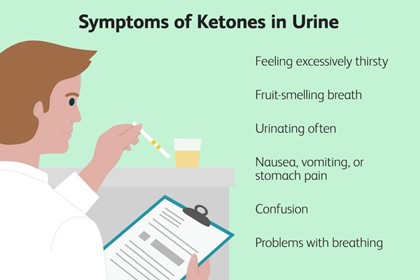A nurse is collecting data for a client following electroconvulsive therapy. Which of the following adverse effects should the nurse expect?
Vomiting
Confusion
Incontinence
Tinnitus
The Correct Answer is B
A nurse collecting data for a client following electroconvulsive therapy should expect that the client may experience confusion as an adverse effect. Confusion is a common side effect of electroconvulsive therapy and can last for minutes to hours after treatment.
The other options are not typical adverse effects of electroconvulsive therapy.
a) Vomiting is not a typical adverse effect of electroconvulsive therapy.
c) Incontinence is not a typical adverse effect of electroconvulsive therapy.
d) Tinnitus is not a typical adverse effect of electroconvulsive therapy.

Nursing Test Bank
Naxlex Comprehensive Predictor Exams
Related Questions
Correct Answer is C
Explanation
c. Ketones positive.
Explanation:
Ketones in the urine can be an indication of diabetic ketoacidosis (DKA) or other metabolic disorders. It is abnormal and should be reported to the healthcare provider for further evaluation and management. Positive ketones suggest that the body is breaking down fats for energy instead of using glucose, which can be a sign of inadequate insulin levels or utilization.
Options a, b, and d are within normal ranges or do not indicate an immediate concern. A specific gravity of 1.020 is within the normal range and indicates appropriate urine concentration. Uric acid levels of 475 mg/24 hr are not mentioned as abnormal or concerning in the context provided. Nitrites negative indicates the absence of nitrites in the urine, which is a normal finding and indicates the absence of a urinary tract infection.
However, it's important to note that clinical judgment should always be exercised, and the nurse should consider the patient's overall clinical presentation and history when interpreting laboratory results and making decisions regarding reporting to the provider.

Correct Answer is ["B"]
Explanation
Answer: B
Rationale:
A) Use written signs to assist the client with locating the bathroom: While written signs may be helpful in the earlier stages of Alzheimer's disease, as the disease progresses, clients may lose the ability to read and comprehend written language. Visual cues, such as pictures or color-coded indicators, tend to be more effective in helping clients navigate their environment.
B) Limit the number of choices for the client: Limiting choices reduces confusion and anxiety for clients with Alzheimer's disease. Providing too many options can overwhelm them, making decision-making difficult. Offering simple, clear choices helps to maintain a sense of autonomy while minimizing stress.
C) Provide a stimulating environment for the client: Although some stimulation can be beneficial, excessive stimulation can overwhelm a client with Alzheimer's disease, leading to agitation and confusion. It's important to create a calm, structured environment that promotes safety and reduces anxiety.
D) Use confrontation to manage the client’s behavior: Confrontation should be avoided when managing the behavior of clients with Alzheimer's disease. Confronting or challenging them can increase agitation and lead to further confusion. Instead, caregivers should use distraction, redirection, and a calm approach to manage difficult behaviors effectively.
Whether you are a student looking to ace your exams or a practicing nurse seeking to enhance your expertise , our nursing education contents will empower you with the confidence and competence to make a difference in the lives of patients and become a respected leader in the healthcare field.
Visit Naxlex, invest in your future and unlock endless possibilities with our unparalleled nursing education contents today
Report Wrong Answer on the Current Question
Do you disagree with the answer? If yes, what is your expected answer? Explain.
Kindly be descriptive with the issue you are facing.
